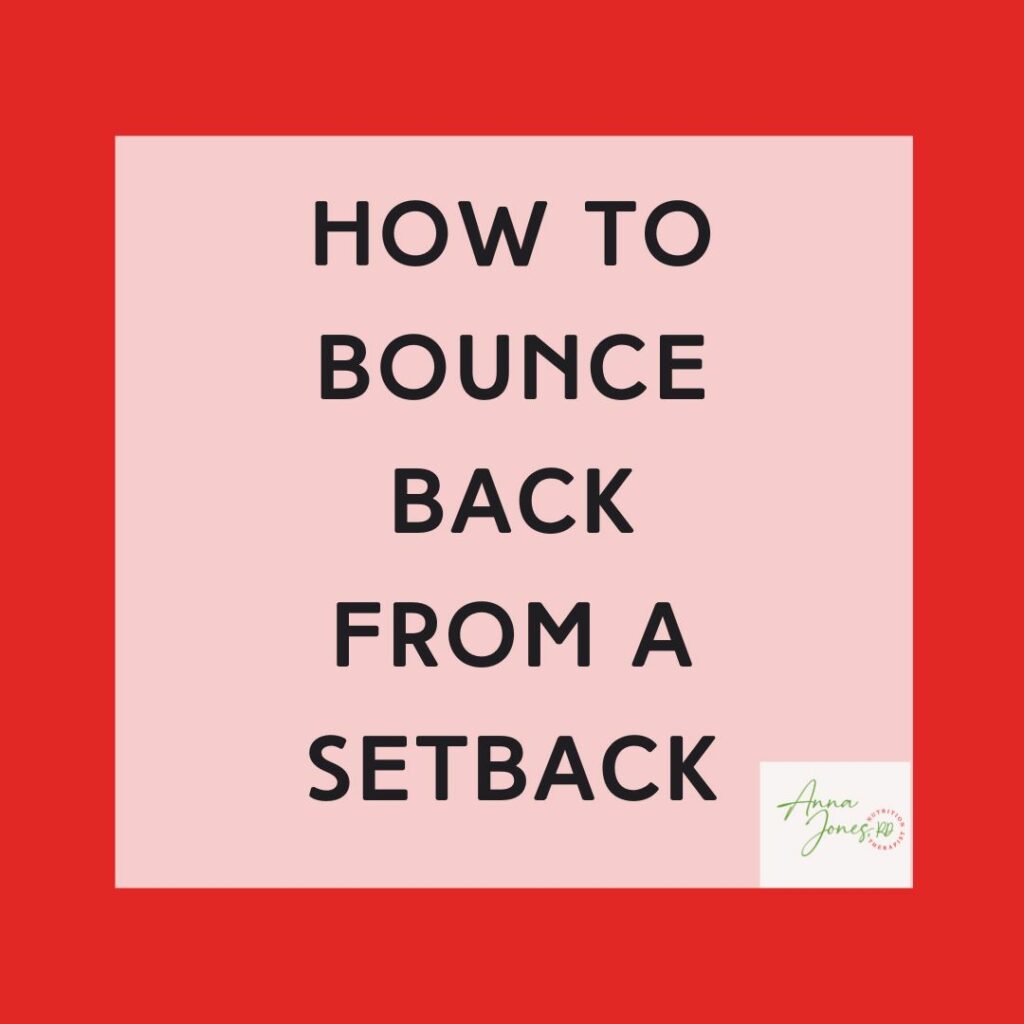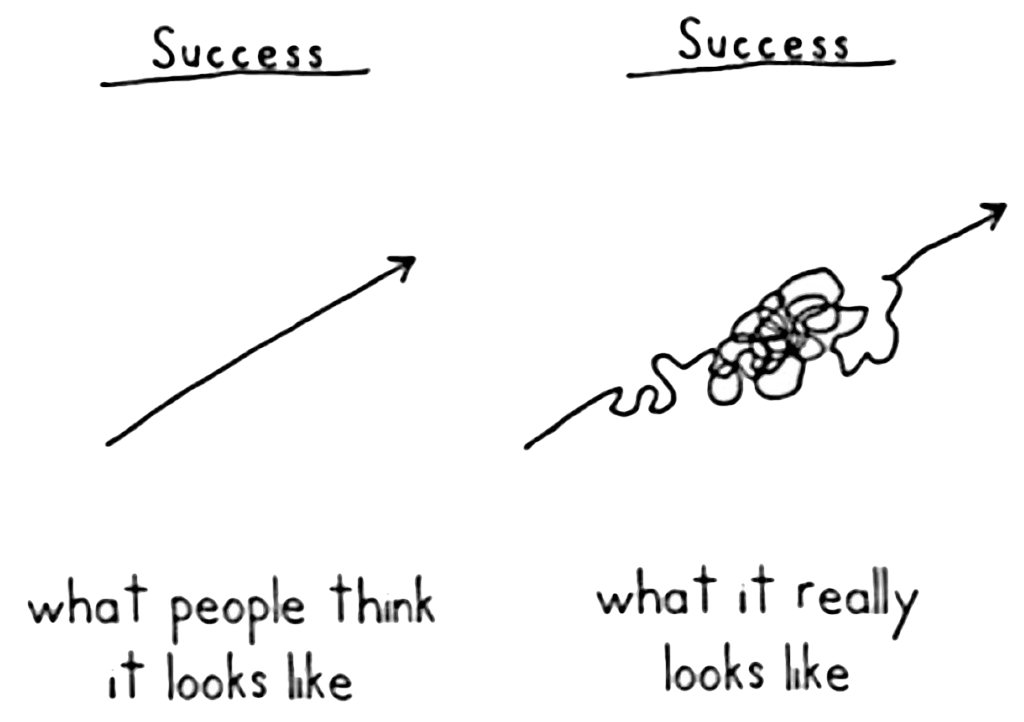
In a session with a client recently we discussed the topic of bouncing back after experiencing a setback. We’ve all done it. We are plugging along successfully sticking with a new healthy habit. We are feeling good and really proud of ourselves, when boom, life gets in our way! Maybe we get sick, we go on vacation, work gets super busy, or we hit the hectic holidays. The ways that life can present obstacles and setbacks can seem endless.
This particular client, a busy working Mama of three kids under the age of 6, had been working really hard to carve out time in her very full days to move her body. She had managed to do this every day for 4 straight weeks. Some days the movement was gentle, some days more intense, but nonetheless she had done it consistently for four weeks in a a row and was feeling great!
She also found that having a routine around movement helped her create other self-care habits that also felt really good. These weren’t big, sweeping things, but instead little things that were representative of her prioritizing her own care and well-being.
And then…she got the flu! The kind of flu that knocked this hard working, busy Mom out for a few days. Then the flu turned into pneumonia. Needless to say, her active streak was disrupted and she had no choice but to allow herself to rest and recover.
As she was recovering from all of this, she was getting ready for a week of travel to see family for the Thanksgiving holiday – throwing yet another wrench in her plans to move her body regularly.
Despite her awareness that her getting sick and the challenges life was presenting were out of her control, she was still struggling with the setback and worrying about how she would get back to doing something that made her feel so good.
Here are some things she and I talked about plus some additional thoughts and suggestions to help her and you bounce back after a setback and respond with resilience.
#1. Setbacks are Normal and to be Expected
Encountering obstacles is just part of being human. It doesn’t mean you have failed or have blown it, or all your previous efforts were for nothing. It is all about how you respond to those obstacles when they arise, because they will.
The perfect word to describe shifting of our response is RESILIENCE. The definition of resilience is “the capacity to withstand or to recover quickly from difficulties.” We build resilience by getting better at dealing with the times when we get off track. Learning to expect setbacks and even plan for them and see them as normal is part of the process of changing behavior. When that happens, it doesn’t have to take away from our progress and past successes.
Success with respect to working on habits that support our health is not about being perfect, but instead being able to develop resilience after we hit a bump in the road. Because even though we think making change should be a straight-line trajectory to success, the reality is that it never is.

#2. Go easy on yourself
I know, this is a tough one. Our self-critic is loud when we feel like we have gotten off track, well all the time really. Learning to replace the critical voice with a kinder more compassionate one can be a more supportive and effective option.
According to the University of California, Berkeley’s Greater Good Science Center, “research shows that when people treat themselves kindly, rather than critically, they are more likely to believe they can improve, correct mistakes, and re-engage with goals after veering off course. In contrast, self-criticism is linked to procrastination, stress, and rumination—none of which motivates people to continue pursuing a goal.”
Self-compassion can allow you to let go of paralyzing perfectionism because it leaves room for human fallibility — the acknowledgement that we all make mistakes sometimes, and that’s okay. Like anything worth learning, it does take practice for sure, but self-compassion could be the difference between giving up on your goals (or avoiding them completely) and achieving them step by step.
#3. Remind yourself of your progress
It is also important to look at the total picture of how things are going rather than only zeroing in on a setback. When we get off track, we typically have trouble remembering all of the progress we have made up until that point. Our brains get hijacked and spiral into negativity, only driving us further from our goals and intentions.
Instead, we can stop this negativity spiral in its tracks by reminding ourselves of the progress we have made up to this point. In my experience this is something we, as humans, have trouble with. Focusing on the setbacks and screw ups comes easier for most of us than focusing on the progress and successes.
This is why I encourage clients to keep a running list of their progress along the way and make time to talk about them in our sessions. This list can include actionable things you’ve accomplished as well as mindset shifts that have been beneficial. Here are a few examples…
- becoming more aware when you are eating out of boredom or for emotional reasons – like loneliness, sadness, etc.
- moving your body in ways you enjoy more often
- an ability to slow down and notice your food and how your body feels in response to it
- an increased recognition of your hunger and fullness cues
- eating balanced meals throughout the day more often
- experiencing less food cravings
- feeling more appreciation and gratitude for your body and what it can do
- an ability to have less food now, because you can have more later
- an increasing ability to notice and deal with emotions (in other ways as well as with food)
You can even take it one step further and think about how all of that progress has made you feel.
- Has it given you more energy?
- Helped you sleep better?
- Helped you feel better in your body?
- Given you more of a sense of peace and calm around food?
Going this one step further helps you see the fruits of your progress, which can make getting back on track even more appealing.
#4. Own your past but know your future can be different
Just because the story in your mind tells you this is how it always goes – you start something new, and you eventually fail – doesn’t mean that it has to always be that way. Our minds are really good at creating stories, but they aren’t always factual. Maybe you have attempted change in the past and that didn’t go as you planned. Maybe it was because you were approaching changing habits with no flexibility and from the wrong mindset. Our brains are amazing and are capable of learning new things and doing things differently at any age or stage of life. Yes, maybe you have tried changing habits in the past and that has been tough. Acknowledge that, own it, and remind yourself you are deciding to do it differently this time.
#5. Make a plan
Trying to make change or get back on track after a setback or obstacle without giving it some thought and making a plan will only make it more difficult. I’m not suggesting a rigid, super detailed plan, but instead one with lots of flexibility and room for trial and error.
Choose the habit or behavior you want to get back to and then give some thought to what needs to happen in the next week to take some steps to get back to it. For example, for my client wanting to get back to moving her body regularly after being sick and traveling, she might look at her week ahead and schedule in time to move her body. She might set her clothes and shoes out the night before, so they are ready to go when she is. Brainstorming options and making a plan can be keys to making lasting changes in habits and behaviors.
Wrap-Up
So, let’s recap. Remember…
- Setbacks are Normal and to be Expected.
- Go easy on yourself.
- Remind yourself of your progress.
- Own your past but know your future can be different.
- Make a plan.
Habits can be hard to change. Life WILL get in our way. It is not a question of if, but instead learning how to respond when we hit bumps in the road. It is possible to bounce back, and continue forward, building resilience each and every time.

0 Comments